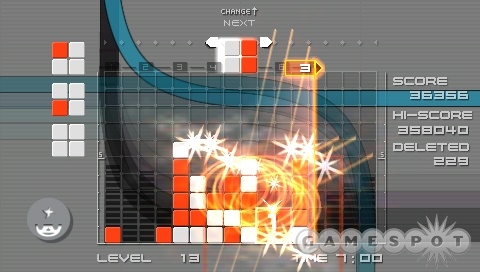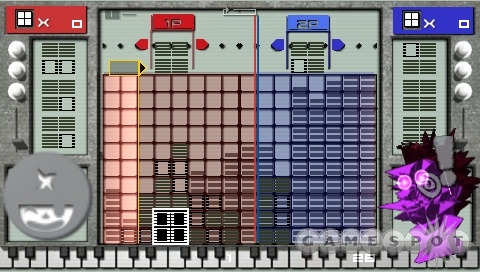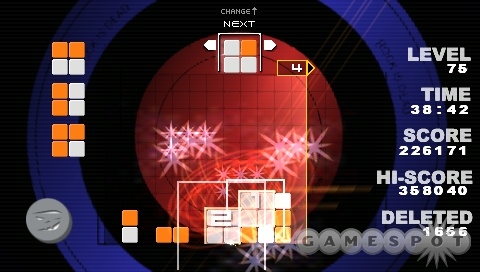In a perfect world, Lumines wouldn't have been sold separately from Sony's slick, new portable gaming system. But the world is still better off now that Lumines is in it. This ingeniously designed, addictive, mesmerizing puzzle game from the creator of cult classics like Rez and Space Channel 5 may not seem as out-and-out impressive as some other PSP launch titles, but it's liable to be the one you keep coming back to. In fact, between the beautiful presentation, the innovative gameplay, and the excellent single-player and multiplayer modes, Lumines may very well be the greatest Tetris-style puzzle game since Tetris itself.

Lumines resembles Tetris on first impression, and it's similarly intuitive to pick up and play--though, the simple design belies tremendous depth. Squares comprising four smaller blocks, which can be one of two colors, fall from the top of the screen. The object is to form solid-colored rectangles of at least two-by-two blocks by rotating and arranging the falling squares properly. Solid rectangles instantly light up and get cleared away as a line (called the "timeline") intermittently passes from left to right across the screen, kind of like a windshield wiper and just like a timeline in a music sequencer program. Clearing blocks in this fashion is how you earn points and also how you prevent blocks from stacking all the way up to the top of the screen; your game ends if the blocks stack too high. Meanwhile, any blocks above the blocks you just cleared automatically drop down until they hit other blocks or the bottom of the screen, and this creates the potential for some big combos. Controls are tight and responsive. Despite having so much horizontal space to work with thanks to the PSP's landscape-style screen, you can just as easily fling a square all the way from one side of the playing field to the other as you can nudge it just a hair's breadth into the perfect spot.
This is all quite simple and basically fun like most Tetris-style puzzle games are fun--especially since Lumines looks and sounds wonderful. Its colorful, swirling backgrounds are clear and clutter-free, the audio cues are noticeable and appealing, and the soundtrack, featuring tracks by Japanese club music pioneer Mondo Grosso, is fun and vibrant. You'll surely notice a great little touch early on, which is that the music dynamically adjusts to fit how you're playing, so the more squares you're clearing in rapid succession, the more the music will swell. The visuals glow and respond to your actions, too. Still images certainly don't do this game's pulsating, dynamic presentation justice. For that matter, the PSP's stereo speakers don't do full justice to the audio, either. Listen to this game with headphones on for an audio experience that, in a way, rivals the surround-sound explosions and screams you might be enjoying with your video game consoles and your fancy home-theater system.
The game's depth doesn't take long to emerge. The main twist is that you'll occasionally get special blocks, which, when formed into a solid rectangle, cause any and all consecutive matching blocks to light up. This means you can sometimes clear a whole bunch of blocks at once, and since you're always given a preview of the next three squares that are going to fall, you'll learn to plan for these important occasions. With enough practice, not to mention a lot of forethought, a steady hand, and a little bit of luck, it's essentially possible to clear the entire screen in one fell swoop--something that's incredibly satisfying and drives your score through the roof.
It's not often anymore that high scores are something you care about in gaming, but this is one of those cases in which you probably will. Lumines has a well-designed scoring system that rewards risk-taking and tenacity, so you'll use your score as a measure of just how good you are at the game's single-player challenge mode. One minor issue with scoring is that you get a big bonus for completely clearing the board of any blocks, yet you'll sometimes get a single-colored square as your very first piece in challenge mode, which then gets wiped out right away, resulting in a freebie boost to your score. Still, unpredictable circumstances like this only add to the game's addictive charm.

Lumines' depth also comes from how its challenge escalates. In most Tetris-style puzzle games, increased challenge is directly proportional to increased speed. Sure enough, in Lumines, squares start falling faster and faster the longer you play, giving you less time to move them around and rotate them into proper position. However, a much more interesting and inventive layer to the challenge has to do with the variable rate at which the timeline washes across the screen. Even as the speed of falling squares increases from level to level, the timeline will often noticeably slow down. On the one hand, this enables you to rack up points faster and faster, because the more blocks you can clean out in a single wipe, the more points you'll get. On the other hand, this means you'll need to be able to hold out for longer and longer as the blocks start to stack perilously high...only to then get cleared out in bigger and bigger chunks. Then again, some levels have the timeline moving very rapidly, which brings about its own set of challenging considerations, since this forces you to act that much more quickly yourself.
Other puzzle games tend to just go faster and faster the longer you play. In short, what's so unique about the gameplay of Lumines is that it often takes on a noticeably and significantly different tone from level to level.
This is partly because Lumines' levels--which, in challenge mode, seamlessly transition from one to the next as you score higher and higher and last longer and longer--tend to take on a radically different look and feel from one to the next. Each level, or "skin," has the same basic elements to it. But the colors, shapes, effects, sounds, and music tend to shift radically. You've got everything from dance club-inspired motifs, featuring silhouettes of dancers cascading across the screen, to much stranger themes like one resembling an old Nintendo Entertainment System-era fantasy role-playing game. Yet, despite the thematic variety, there's clearly an overarching cohesion to the game's style, helping make long sessions of Lumines a relaxing, almost Zen-like experience rather than a dizzying, mind-melting one like you get from playing too much WarioWare at a time. Some skins are thematically similar to others, but in all, there's actually an almost shocking amount of variety to the presentation. And this turns out to be a real treat, especially for those who've grown too accustomed to the conventionally static-looking puzzle genre.

The thing about Lumines' challenge mode is that you go through the levels in the same sequence each time, so you'll get very used to seeing the game's first few skins. This isn't really problematic in and of itself, but some kind of a "shuffle" mode would have been nice, as well as consistent with the music-inspired design. Still, you get plenty of other options, such as time trials that challenge you to earn high scores in small amounts of time and the ability to choose to play in any of the skins you've previously unlocked. There's also a pretty entertaining puzzle mode, in which you don't need to worry about forming rectangles, for a change, but must instead make various shapes out of the falling two-toned squares. The puzzle shapes get progressively more complicated, and this mode is a good diversion overall.
Then there's Lumines' versus mode, which you can play against a computer opponent or against a friend (who's also got a PSP and a copy of the game) using the PSP's built-in Wi-Fi support. Versus mode adds a very interesting tug-of-war element to the core game by dividing the playing field down the middle into two parts and then forcing the two competing players to try to push the barrier toward their opponent, reducing the amount of room the adversary has to work with, while freeing up more room for themselves. Versus mode is somewhat more passive than competitive modes in some other puzzle games, since you'll invariably focus on your own playing field rather than on what your opponent is up to. However, that's mostly because the fast pace of versus mode doesn't give you time to stress over what your opponent's next move will be, and overall, it makes for an exciting and distinctly different variation on Lumines' primary single-player game.

When playing against the computer in versus mode, you'll notice that you always take on the same opponents in the same order, kind of like how challenge mode is also a linear sequence of levels. The thing is, versus mode ramps up in difficulty quickly--have fun trying to get past your fourth or fifth challenger. Actually, you probably will, and you'll also probably appreciate that Lumines tracks your win/loss record against any human opponents you take on. You and your opponents are more than just names on each other's lists, by the way. You get to choose a persona from among many amusingly animated icons, including some tough-to-find unlockable ones.
You wouldn't think a game about arranging colored blocks into rectangles could be this interesting and this engrossing. At the heart of Lumines is an ingenious design, which someone theoretically could have dreamed up years ago, but no one did until now. And at the soul of Lumines is something that you might call completely pure. You wouldn't expect a game like this to incorporate most all of what's good about gaming--the sights, the sounds, the trancelike experience, the option of competition--but Lumines does all that.